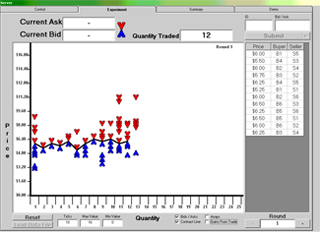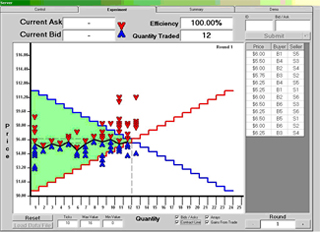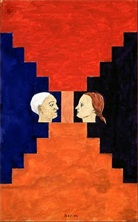| Download |
Software
With the generous support from IFREE, CEEE develops software and distributes it for free for teachers interested in using economic experiments in their classrooms. Please contact Dafina Mulaj for a password to download the software.
Handrun Programs
The first programs conducts a double auction to complement the lessons on supply and demand, and the second involves various voluntary contributions mechanisms to support lessons on public goods. These programs require a computer running Windows XP attached to an LCD projector.
The figure below displays a screen shot for debriefing the results of a double auction experiment using high school students. The left panel is the screen that is displayed to the students during the experiment. Each red caret indicates an ask to sell and each blue caret a bid to buy. Where they meet is a contract between a buyer and a seller. The first contract is displayed on the left most portion of the figure and is also reported at the top of the table on the right. During the debriefing with the students, the professor then clicks on the checkmark boxes at the bottom of the screen to overlay the supply and demand of the market, stressing the importance of the private and dispersed knowledge of these values and costs, and yet through the course of the trading, these students in the first period of trading exchange the competitive quantity at prices near the competitive prediction. The professor can also click on a checkmark box to shade in green the proportion of the total gains from trade that the students realized, which in this example is 100% in period 1.


LAN Teaching Suite
These programs require a computer for each student running Windows XP connected via a local area network and one computer for the monitor:
- normal form games for game theory lessons on prisoners' dilemma, coordination games, battle of the sexes,
- extensive form games for game theory lessons on sequential decisions and backward induction in trust and centipede games, including sorting mechanisms of McCabe, Rigdon, and Smith (2006),
- single and double blind ultimatum games for lessons on bargaining, with options for both buyer-seller and proposer-responder contexts with and without contest entitlements in Hoffman et al. (1994),
- networked version of voluntary contributions mechanisms for providing public goods, including Kurzban et al. (2001) real-time mechanisms,
- double auction asset markets for lessons on public information versus endogenous expectations in markets,
- one-sided auctions for further lessons on the role of institutions in supply and demand with options for English outcry (with hard or soft endings), English clock, Dutch clock, and first- and second-price sealed-bid auctions,
- electric power markets for further applications on supply and demand implementing Wheatstone bridge networks and active versus passive buyers in Rassenti et al. (2003), and
- combinatorial clock auction for advanced discussions on auctions for spectra.
Program Your Own Experiment
The programming example provides the source code for the ultimatum game. It is written in Visual Basic 6. Visual basic 6 is recommend over visual basic .net 2003 because of its ease use. Visual basic.net 2005 looks to be a good replacement but is not yet in wide spread use. The example assumes you are familiar with visual basic 6 or have some basic programming knowledge. If you do not it is recommend that you get a book on the subject. Amazon typically has a large selection books on VB6.
Price Gouging
The Price Gouging experiment is for teachers interested in demonstrating the effects of price gouging between a group of buyers and sellers. It has a separate set of installation instructions included in the zip file.

In 2002 Vernon Smith was awarded the Nobel Prize in Economic Sciences.
Website Questions : |
George Mason University
Phone: 703.993.4850
Fax: 703.993.4851
Email: Dafina Mulaj